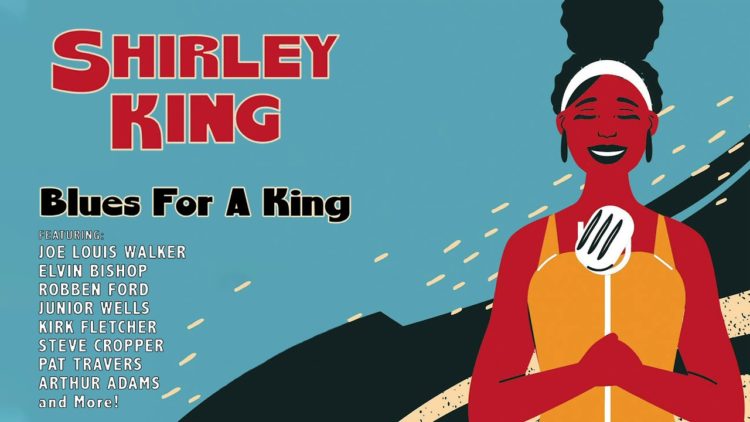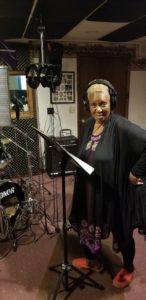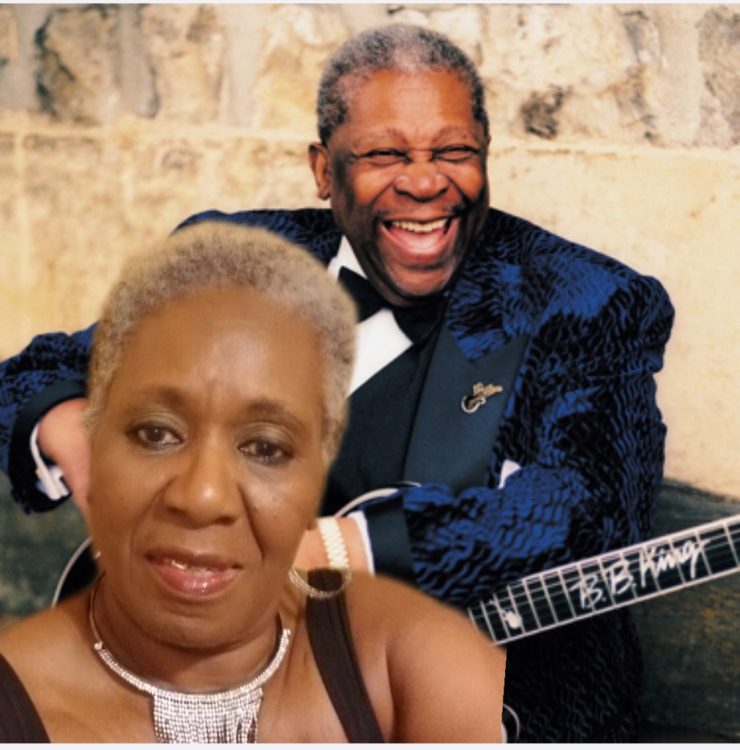
If anybody has earned the right to add the tagline ‘Daughter of the Blues’ to their professional resume, it’s Shirley King. The first-born daughter of legendary blues artist B.B. King, and a gifted, multi-talented artist in her own right, King wears her affection for her beloved father on her sleeve, and waxes eloquent about the impact that he had on her life and her career.
It was an impact that focused on her NOT riding his coattails, but instead creating her own path to success in the entertainment business. It’s one of the reasons why in 2020, at 70 years of age, Shirley King is only now releasing her first professionally produced, label-supported album, Blues For A King. It came out in June on Cleopatra Records, and is already generating a buzz both inside and outside the blues community.
Blues for A King features an impressive array of guest artists, representing a rather broad cross section of genres, including the likes of Joe Louis Walker, Elvin Bishop, Robben Ford, Junior Wells, Kirk Fletcher, Steve Cropper, Pat Travers and more.
All but two of the songs [All Of My Lovin’ and Give It All Up] are covers, including Dave Mason’s Feelin’ Alright?, Arthur Crudup’s That’s All Right Mama [most famously covered by a young Elvis Presley], The Traffic hit Can’t Find My Way Home [which features long-time former Jethro Tull guitarist Martin Barre] the traditional folk song Gallows Pole, and King’s favourite track on the album, a cover of At Last, which was composed by Mack Gordon and Harry Warren and immortalized by the late Etta James.
Shirley King has been in the entertainment business in one capacity or another for more than 50 years. She started her career not long after moving to Chicago in the late 1960s as a dancer, not a singer, only taking up that profession when the physical rigours of dancing many times a week took their toll. Even then, she wasn’t a recording artist, preferring to sing cabaret-style acts with a variety of songs, without really ever wanting to follow in her lauded father B.B. King’s footsteps as a blues artist.
“I don’t want to always be seen as famous because I am B.B. King’s daughter. I want to be famous and successful because I am pretty good at what I do. I could have gone into acting, I could have gone into singing, I could have gone into dancing which I did. I wanted to do something where I could get famous and well known doing it as Shirley King, not because I was B.B. King’s daughter. The reason I started singing was because I had to stop dancing; I had gotten up there in age a little bit and when I saw that it was possible to make a living singing the blues, even if I didn’t have an album out there, or even if you weren’t the best singer,” she said.
“But I was already a natural performer, which made me different on the blues scene. And that intimidated and sometimes confused people because I didn’t come in looking like the traditional big ol’ overweight blues singer. I came in and my body was still in good shape, so I danced in my singing shows. I did something cabaret style where there was more than just singing and that made me stand out and kind of jump ahead of some people who felt like I should have got in line and waited my turn. I don’t know what that means, because I was just being myself and people responded to it, so I kept getting bookings. I worked hard at it too, because I wanted to show my dad what I was doing, while he was here.

“In 2014 my dad looked at me, so weak he could hardly sit up straight and he said, ‘baby, I am so proud of you. You did just what I told you to do.’ And he actually passed the torch to me, in 2012, right on Buddy Guy’s stage, in front of Buddy Guy and George Benson. They wanted daddy to go down to Buddy’s club and jam with them. He went there, but he grabbed me by the hand and took me with him. I was standing there and before he walked out on stage, he asked me to come with him and jam, so we did The Thrill is Gone. But they will not release that video or audio, that’s how much some people hate me being B.B. King’s daughter. I have never understood that, but I always knew that my father had a reason for me to not coattail on his name. I didn’t understand it at first until I saw the difference it made in people when he did come to my shows. I would sometimes get booked in the same town as him because they thought he might show up and a couple of times he did, and it would be good for their business. But when he didn’t show, these guys would get mad at me. They were supposed to be paying Shirley King to play, but I had to fight for my money sometimes because they expected my dad to show up. Once I saw that with my own eyes, I stopped bugging him to come to my shows, and didn’t get booked where he was playing. At the time, I didn’t understand when he told me things like that, but he never told me nothing that he couldn’t turn around a prove. If he told me something, there was always a good reason behind it. I always get talked about because of my performances on stage. I am a performer through and through. I used to watch my dad when he was on shows with Jackie Wilson, Sam Cooke and James Brown, learning from them and from my daddy from the time I was three years old until he left this earth in 2015. I know how to work a stage and always have, but for the longest time I didn’t have anybody who wanted to respect me enough to do something for Shirley King, without B.B. King being involved.”
B.B. King passed away in 2015, and left behind a number of family members, including many children, with Shirley being the eldest daughter. For many years, there was pressure on her from less than scrupulous managers, booking agents and other music industry types to cash in on her dad’s legacy while he was still alive, but she refused, fervently adhering the advice proffered by her father for many years, including not long before he left this earth for music heaven.
“When my dad was active, I didn’t want people to say that I was trying to compete with my dad. I didn’t even worry about putting out an album or anything like that. A lot of blues people [purists] have been coming out and hating on me on Facebook and all over because for so long they feel they have been able to keep me out of the picture, and always wanted to keep me out of it. But really, I was just letting my dad get all his limelight, while I sat back and just did my own thing,” she said.
“My dad said, ‘let other people coattail on my name, because they’re not my kids. You make a name for yourself so when I am not around, you will be able to carry on and live up to what you are doing and what you did, not what I did.’ And my God that was the best information he could have ever gave me because now I have been in the media being talked about it and people are just lovin’ on me and this CD.”
Although King has recorded music before, Blues For A King is truly her proper debut album, one that has the full co-operation of the Cleopatra team behind it.
“The first CD I did a long time ago, and it was done by people who were helping me out and it came out over in Japan, but I never heard about it no more. The other CD, a lady wanted to kind of control me and didn’t have any connection to the music business and was pissing people off and everything, and she took that CD and just shoved it in a closet somewhere. So, I had never put out a CD and had someone do a good job of producing it and promoting it. What has happened to me literally has never been done for me before, and it’s perfect timing because my dad is not here anymore, so I know can make a real living and a real career on my own. I need to be out here making my own way, which is what my father told me he wanted me to do. And that’s another reason I am so happy to be talking to people like you, because I am doing what my dad asked me to do,” she said.

“All parts of the record business came together for this, the PR business, the booking agents – everybody. Cleopatra went around to all these folks and pulled me right in and they took control of the whole situation. I don’t even know a lot of the people who played on the CD because they were brought in by the record company. But Cleopatra Records have promoted me like I have never been promoted before. I have been getting to do these amazing interviews. I think I have done almost 100 since the CD came out [in June]. I have a team of people that are working for me now, that believes in me, that let me be Shirley King, who happens to be B.B. King’s daughter, not B.B. King’s daughter, what’s her name. It’s given me a chance to be on record with people of legacy. I have legendary people playing on here with me.”
It is an interesting situation to note that for much of the process of recording the songs for the album, King herself wasn’t completely sold on the choice of tunes being offered to her, feeling they were outside her style. With the benefit of hindsight, and the comments of those who have heard the album in its entirety, it seems as though the selection was tailor made for her by producer Jurgen Engler and A&R person John Lappen.
“I think this CD couldn’t have happened at a more perfect time. My dad is like the sun for me, he is a guiding light. And I tell you he is with me all the way, because there were days where I struggled because I didn’t feel like they were giving me songs that I could sing. But in the end, I kept hearing my dad’s voice saying to do it because they were paying me. I am living off what they are paying me to do the album and now they’re doing all this wonderful album promotion, so it’s been amazing, even though there were times when I got frustrated,” King said.
“I had to Google search some of the songs, like Johnny Porter because I knew none of these songs, not really. Of course, I knew At Last because that’s my idol Etta James. I never wanted to sing Etta James because I don’t think anybody should sing Etta James’ At Last except for Etta James, but I got paid, so I did what I was told to do, and did it as best as I could.”
King also didn’t participate in the process for choosing collaborators on the album, again something primarily orchestrated for her by Lappen and Cleopatra’s brass. But as with the songs themselves, this process proved to be equally as inspired and eminently successful upon listening to the final mixes.
“It was Cleopatra’s idea to bring in the guests. I don’t know any of these musicians, I never met them. I didn’t go into the studio with them, they sent me like a karaoke type track to do my vocals on, I didn’t have the real music that would be on the CD, I didn’t know how these guests were going to sound. After that they would get the musicians and the special guests and do the proper tracks, and added my vocals which I sang to the karaoke tracks and now you can hear what they did,” adding that there was never any discussion, nor would she brook one if it happened, of covering any B.B. King songs.
“No blues label would even give me a chance to have a record out, not one. Even the B.B. King Blues Club, the guy who owned that said he didn’t particularly care for how I sing, and that really should have been the first place I was working at, it carries my dad’s name. But I was disrespected by so many things and so many people when it came to my father’s name,” she said.
“People are always asking, well why are you not singing with the B.B. King Band. Well because it’s really only two members. B.B. King band members did not want to come back out here after my daddy passed. There’s been so much negativity going on and its still going on. I have decided to go right on past it. And now I have enough money to get a lawyer because people are taking my dad’s stuff and won’t allow me to have things that I should have had, personal things. They went and had an auction and sold all my daddy’s stuff that should have gone to a museum. It is so mean what they have done to my father since he left this Earth, but I know God is going to fix it.
“I won’t be like that because my father was never like that. He wasn’t nasty. He didn’t hate on people; he wasn’t jealous of nobody. I guess it’s pretty hard to be jealous of anybody when you done made such a big name for yourself. That’s why he kept telling me not to coattail while he was still out there. Cleopatra is doing so much for me, like my daddy’s management did with him later in his career, putting him with people like U2 and Jeff Beck and Eric Clapton. People saw that I needed to be presented with totally different stuff and to put me with people that are well known so that everybody is going to be talking about this CD. I am glad people are seeing that now, because maybe I can get back a little respect. I have been working so hard, and people have always been telling me that I am good, but it took this for me to feel confident about myself and that I am making my own way. And what my dad told me has materialized, because I see that Cleopatra took me out of my comfort zone and put me somewhere different and now the world is talking about Shirley King and this music.”
King says she has never felt happier or more fulfilled in her life and appreciates every moment of this current rise to prominence.
“I never felt as important as I do now, and my self esteem is at the top of the charts. I am like at 125 per cent in my self confidence now, which I had never had before. Even when my father used to tell me I was good, I always though he was just being a good father. But he knew that helping me in a really direct way would mean me laying on him like a crutch and he didn’t want that. He knew it wasn’t good for me in the long run,” she said.
“My dad wanted to make his own mark. He didn’t want to sound like anyone else, he didn’t want to play like Muddy Waters or Howlin’ Wolf. Those were his friends, but he didn’t try to be like none of them. He was glad to play with other people; he knew people could play his songs, but he liked the challenge of playing along to other people’s songs, which helped build his confidence. My daddy got a big boost when he was 68 years old and I am now 70 and it’s happening for me, the identical thing. Now I say I want to make it 19 more years which means I will be the same age as my daddy – he kept living until he was 89 and stopped playing when he was 88. And I was right there in the audience for his last show at the House of Blues [in Chicago on Oct. 3, 2014].”
For more information on Shirley King ‘Daughter of the Blues’ and Blues For A King, visit www.facebook.com/shirley.king.102.
- Jim Barber is a veteran award-winning journalist and author based in Napanee, ON, who has been writing about music and musicians for nearly 30 years. Besides his journalistic endeavours, he now works as a communications and marketing specialist. Contact him at jimbarberwritingservices@gmail.com.
https://www.youtube.com/watch?v=4tvTLrIjccs&list=PLdJ7Hx0SXIzFNCSMzdd6NR3ddKeynYJX_&index=3
SHARE THIS POST:
